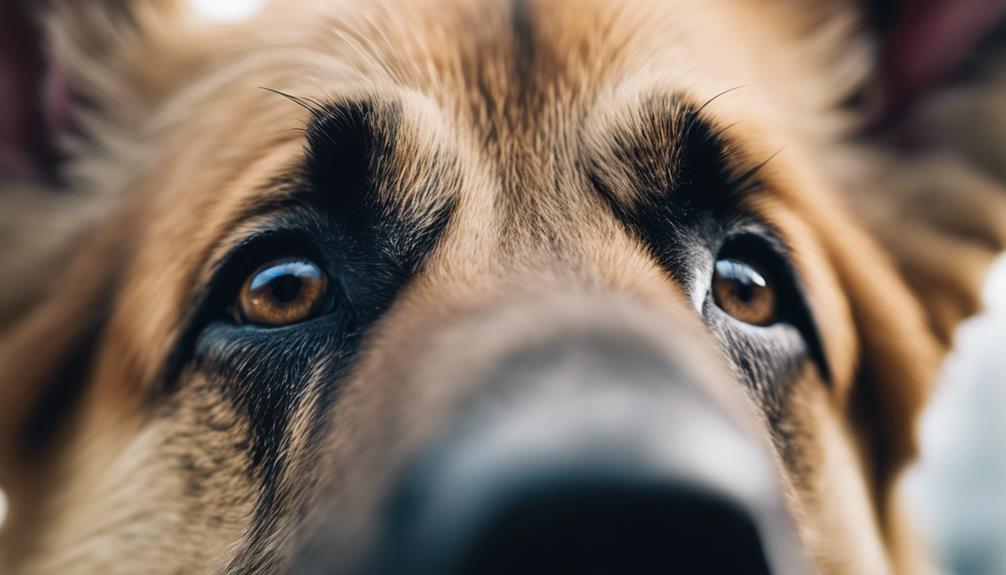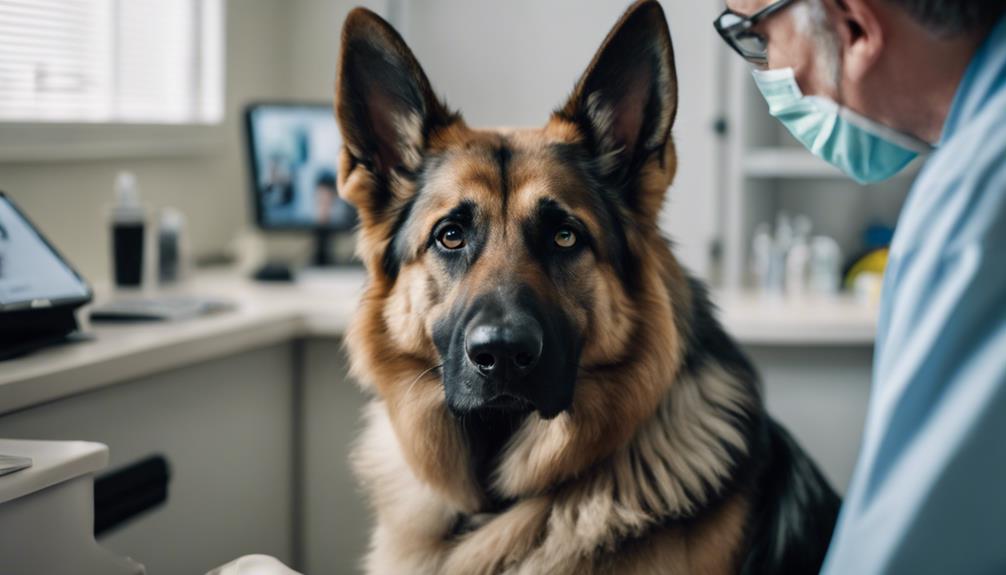🐾 Paw-some Partnership Alert! 🐾
As a pack of German Shepherd enthusiasts at MixGermanShepherd.com, we're always sniffing out the best products for our furry friends. Guess what? When you fetch something from Amazon through our links, we earn a little treat! 🦴
Did you know that German Shepherd mixes are prone to a specific eye condition called Pannus? This autoimmune disease can have serious implications for their vision. Understanding the signs and symptoms of Pannus is crucial for early detection and effective management. Stay tuned to discover essential tips on how to protect your German Shepherd mix's eye health and ensure a bright future for your furry companion.
Key Takeaways
- German Shepherd mixes are prone to Pannus, requiring regular vet check-ups for early detection.
- Pannus in mixed breeds is influenced by genetics, UV exposure, and environmental triggers.
- Treatment options for Pannus include corticosteroids, immune-modulating drugs, and UV protection measures.
- Preventative care involves regular eye exams, a balanced diet, UV protection, and prompt veterinary attention for any discomfort.
Common Eye Health Issues in German Shepherd Mixes

German Shepherd mixes commonly experience a range of eye health issues, primarily attributed to their genetic predisposition, with Pannus being a prevalent concern. Pannus, also known as chronic superficial keratitis, is a condition where the cornea becomes inflamed due to an abnormal immune system response. In German Shepherd mixes, this can lead to symptoms such as redness, excessive tearing, and corneal discoloration. Regular veterinary check-ups are crucial for early detection and management of eye conditions in these breeds.
When it comes to treatment options for eye health issues in German Shepherd mixes, medications like corticosteroids and immunosuppressants are often prescribed to control the inflammation associated with Pannus. Preventive measures play a significant role in preserving eye health, including minimizing exposure to UV light and consistent monitoring for any changes in your dog's eyes. By staying proactive and attentive to your German Shepherd mix's eye health, you can help ensure they maintain optimal vision and comfort.
Understanding Pannus in Mixed Breeds

Pannus in mixed-breed dogs, much like in purebred German Shepherds, can stem from genetic factors and environmental triggers. Understanding the causes and available treatment options for pannus in mixed-breed dogs is crucial for effective management. By following similar diagnostic and treatment protocols as those for purebred dogs, you can help maintain your mixed-breed dog's eye health.
Pannus Causes Explained
Understanding the causes of Pannus in mixed breed dogs involves a consideration of various factors beyond just genetic predisposition. UV light exposure plays a significant role in triggering Pannus in German Shepherd mixes, along with underlying genetic factors. Additionally, environmental factors such as pollution or irritants may exacerbate the condition. These influences can interact with the genetic predisposition, leading to the development and progression of Pannus in mixed breed dogs. By understanding these multifaceted causes, owners of German Shepherd mixes can take proactive steps to minimize UV exposure and environmental triggers, thus potentially reducing the risk and severity of Pannus in their beloved pets.
Treatment Options Available
Are there effective treatment options available for managing Pannus in mixed breed dogs? When it comes to treating Pannus in mixed breed dogs, various options can help manage this eye condition effectively. Common treatments include corticosteroids to reduce inflammation, immune-modulating drugs to regulate the immune response, and antibiotics to address any secondary infections that may arise. Additionally, regular veterinary check-ups are crucial for monitoring the progression of Pannus and adjusting treatment as needed. In conjunction with medical treatments, UV protection measures, such as specialized goggles, are recommended to prevent the advancement of Pannus in mixed breed dogs.
| Treatment Options | Description |
|---|---|
| Corticosteroids | Reduce inflammation in the eyes |
| Immune-Modulating Drugs | Regulate the immune response |
| Antibiotics | Treat secondary infections |
| UV Protection | Prevent advancement of Pannus |
Preventative Care for Eye Health

Regularly scheduling eye exams for your German Shepherd mix can assist in the early detection of potential eye health issues. German Shepherd dogs are prone to conditions like chronic superficial keratitis, making proactive eye care crucial for their well-being. Providing a balanced diet rich in essential nutrients, such as vitamins A, C, and E, can support optimal eye health in your furry companion. Additionally, avoiding exposure to excessive UV light by limiting outdoor time during peak sunlight hours and using doggie sunglasses can help prevent potential eye problems in German Shepherd mixes. Maintaining a clean living environment for your dog, including regular grooming to prevent hair from irritating their eyes, can reduce the risk of eye infections and irritations. Remember, seeking prompt veterinary care for any signs of eye discomfort or abnormalities is crucial for the overall eye health of your German Shepherd mix. By implementing these preventative measures, you can help safeguard your pet's vision and ensure a lifetime of healthy eyes.
Managing Cataracts in Mixed Breeds

When managing cataracts in mixed breed German Shepherds, it's essential to consider the available cataract surgery options and the potential benefits for restoring vision. Early detection and intervention play a crucial role in preventing cataracts from significantly impacting your dog's eyesight. By staying proactive and seeking timely veterinary care, you can help your mixed breed German Shepherd maintain optimal eye health and quality of life.
Cataract Surgery Options
Managing cataracts in mixed German Shepherd breeds involves considering various surgical options to restore vision and enhance quality of life. When it comes to cataract surgery, you have several options to choose from, including:
- Phacoemulsification: This technique uses ultrasound to break up the cloudy lens for easier removal.
- Intraocular Lens Implantation: After removing the cataract, an artificial lens is implanted to improve vision.
- Post-operative Care: Following surgery, it is crucial to provide proper care to ensure successful outcomes. This includes administering medications as prescribed, preventing your dog from rubbing their eyes, and attending regular follow-up appointments to monitor the healing process. By following these steps, you can help your mixed breed dog regain clear vision and lead a better quality of life.
Preventing Cataracts Early
To proactively safeguard the vision of your mixed-breed German Shepherd, early detection and proactive management strategies for cataracts are imperative. German Shepherds, including mixed breeds, are prone to cataract development, which can significantly impact their eyesight. Scheduling regular eye exams for your furry companion is crucial in identifying cataracts at an early stage. If cataracts are detected, prompt intervention is necessary to prevent vision loss. In some cases, surgical removal of cataracts may be recommended to restore your dog's vision. Following surgery, proper post-operative care and diligent monitoring are essential for successful cataract management in German Shepherd mixes. By staying vigilant and proactive in your pet's eye health, you can help ensure they enjoy clear vision and a high quality of life.
Glaucoma Awareness in Mixed Breeds

How crucial is regular veterinary eye examinations for early detection and management of glaucoma in mixed breed dogs, including German Shepherd mixes? Glaucoma, a serious eye disease, can impact the vision and overall eye health of your beloved pet. Diagnostic tests are vital to identify glaucoma in its early stages, allowing for prompt intervention. Here are three key points to consider regarding glaucoma awareness in mixed breed dogs:
- Increased Eye Pressure: Glaucoma is characterized by elevated pressure within the eye, which can lead to optic nerve damage.
- Symptoms to Watch For: Keep an eye out for signs such as redness, cloudiness, pain, and changes in vision, indicating a potential issue with glaucoma.
- Timely Treatment Is Critical: Early detection through regular eye exams enables timely treatment, which may involve medications, surgery, or other interventions to preserve your dog's vision and eye health.
Stay proactive in monitoring your mixed breed dog's eye health to catch glaucoma early and provide the necessary care to maintain their quality of life.
Importance of Regular Eye Exams

Regular eye exams are essential for German Shepherd mixes to catch eye health issues early. Identifying conditions like pannus, cataracts, and glaucoma in their initial phases can lead to better treatment outcomes. Veterinarians may suggest specific preventive measures or treatments depending on the results of these exams.
Routine Eye Check-Ups
Regular eye check-ups play a vital role in detecting and managing eye health concerns in German Shepherd mixes. It is crucial to prioritize regular check-ups to ensure the overall well-being of your furry companion. Through routine eye exams, veterinarians can identify early signs of conditions such as pannus, allowing for timely intervention and treatment. By monitoring changes in eye health during these check-ups, potential vision loss can be prevented, enhancing the quality of life for your German Shepherd mix. Remember, proactive care is key in maintaining optimal eye health for your beloved pet.
- Early detection of conditions like pannus
- Prevention of potential vision loss
- Specialized care and treatment plans based on exam findings
Early Detection Benefits
To ensure the early detection of potential eye health concerns in your German Shepherd mix, prioritizing routine eye exams is essential. Regular eye exams play a crucial role in catching any issues early, allowing for timely intervention and management. By monitoring changes in your dog's eye health through these exams, you can help prevent vision loss and ensure a higher quality of life. Veterinarians recommend annual eye check-ups to maintain optimal eye health in German Shepherd mixes. Here is a table highlighting the significance of regular eye exams for early detection:
| Benefits of Regular Eye Exams |
|---|
| Early Detection of Issues |
| Timely Intervention |
| Improved Treatment Outcomes |
Preventive Care Measures
For optimal eye health in your German Shepherd mix, prioritize routine eye exams to proactively detect and address any emerging concerns. Regular eye exams are crucial for identifying early signs of eye health issues in German Shepherd mixes. Preventive care measures, such as monitoring for symptoms like redness or cloudiness, play a vital role in maintaining optimal eye health. Early intervention through consistent check-ups can effectively prevent the progression of eye conditions. By promptly identifying and addressing any changes in eye appearance or behavior, you can significantly improve the outcomes for your German Shepherd mix's eye health. Remember, routine veterinary visits and eye examinations are key in ensuring the overall well-being of your furry friend's eyes.
Dealing With Corneal Dystrophy

When dealing with corneal dystrophy in German Shepherd mixes, it is crucial to understand the genetic nature of this condition and its impact on the clarity and transparency of the cornea. Corneal dystrophy can result in vision impairment or even blindness as abnormal material accumulates in the cornea, leading to cloudy or hazy eyes, excessive tearing, and changes in vision. Diagnosis requires a comprehensive eye examination by a veterinarian, with specialized tests to evaluate corneal health. Treatment options aim to manage symptoms and preserve vision, which may involve medications or surgery tailored to the individual dog's needs. Regular monitoring and follow-ups are essential to track the progression of the condition and adjust treatment accordingly. By staying proactive and informed, you can provide the best care for your German Shepherd mix with corneal dystrophy, ensuring their eye health and overall well-being remain a top priority.
Tips for Eye Health Maintenance

Maintain your German Shepherd mix's eye health by incorporating regular cleaning routines to prevent debris buildup and potential infections. Keeping your dog's eyes clean is essential for their overall eye health. Remember to use a damp cloth or specially formulated wipes recommended by your veterinarian to gently wipe away any dirt or discharge.
Tips for Eye Health Maintenance:
- Regular Veterinary Check-ups: Schedule periodic visits to a veterinary ophthalmologist to ensure your dog's eyes are in good health.
- Balanced Diet: Provide a diet rich in essential nutrients like vitamin A to support your dog's eye health.
- UV Light Protection: Shield your German Shepherd mix from excessive ultraviolet light exposure to lower the risk of eye conditions such as pannus.
Handling Progressive Retinal Atrophy

To effectively manage Progressive Retinal Atrophy in German Shepherd mixes, it is crucial to understand the genetic nature of this eye disorder and its impact on the dog's vision. Progressive Retinal Atrophy (PRA) is a hereditary condition that causes the gradual deterioration of the retina, leading to vision loss in affected dogs. Symptoms of PRA include night blindness, dilated pupils, and eventual complete blindness. Diagnosis typically involves specialized eye exams like electroretinography (ERG) to evaluate retinal function accurately.
While there is currently no cure for PRA, genetic testing plays a vital role in identifying carriers of the PRA gene. This knowledge can help inform breeding practices to reduce the prevalence of this condition in German Shepherd mixes. By identifying carriers and avoiding breeding them with other carriers, the risk of passing on PRA to future generations can be minimized. Additionally, supportive care and environmental adaptations are essential in providing a good quality of life for dogs affected by PRA. Regular veterinary check-ups and monitoring can help in managing the progression of the disease and maintaining the overall well-being of the affected dog.
Supporting Eye Health in Mixed Breeds

Supporting optimal eye health in mixed-breed dogs, including German Shepherd mixes, requires proactive measures such as regular eye check-ups and a balanced diet rich in essential nutrients. When it comes to maintaining the eye health of German Shepherd mixes, there are key strategies to consider:
- Regular Eye Check-ups: Schedule routine eye examinations with a veterinarian to detect any potential issues early on.
- Balanced Diet: Provide a diet that is high in essential nutrients like Vitamin A, Omega-3 fatty acids, and antioxidants to support overall eye health.
- Collaboration with Veterinarian: Work closely with a veterinarian to develop a personalized eye care plan tailored to the specific needs of your German Shepherd mix.
Frequently Asked Questions
What Is the Most Common Eye Disease in German Shepherds?
The most common eye disease in German Shepherds is Pannus, an immune-mediated condition that affects the cornea. Early detection is key. Treatment involves lifelong management with medications like corticosteroids. Preventative measures include limiting UV light exposure due to genetic predisposition.
What Are the Symptoms of Corneal Pannus?
Spotting signs such as progressive pigmentation, mucoid discharge, and thickening of the third eyelid could indicate corneal pannus in German Shepherd mixes. Regular vet visits are crucial for managing this condition effectively.
Do German Shepherd Mixes Have Health Problems?
You should be aware that German Shepherd mixes can inherit genetic predispositions to health problems. Regular vet check-ups and preventive measures like proper nutrition and exercise can help manage these risks. Stay proactive for your pup's well-being.
What Is Keratitis in German Shepherds?
Keratitis in German Shepherds is inflammation of the cornea caused by genetic predisposition. Treatment involves immuno-suppressant eye drops and corticosteroids. Prevention includes UV light reduction and regular vet visits. Manage keratitis in Shepherd mixes diligently.
Conclusion
In conclusion, ensuring optimal eye health for your German Shepherd mix is like tending to a delicate garden – requiring careful attention, regular maintenance, and proactive measures to preserve its beauty and vitality. By staying vigilant with veterinary check-ups, early detection of eye conditions like Pannus, and consistent adherence to treatment plans, you can cultivate a flourishing garden of sight for your beloved furry companion. Remember, the eyes are the windows to the soul, so nurture them with care.
